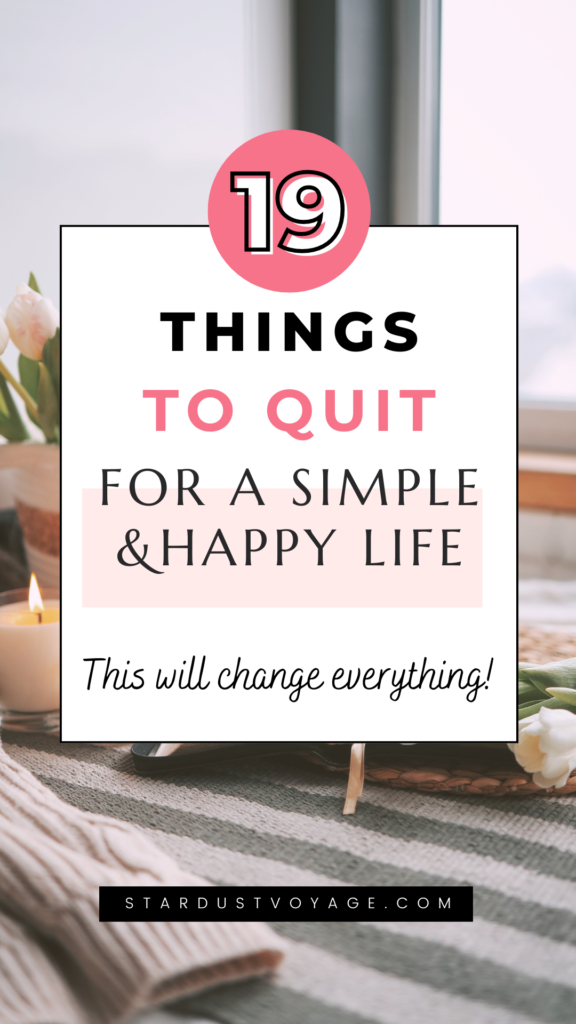From Chaos to Calm
Life can easily become a tangled web of obligations, expectations, and mental clutter. I’ve felt it — that heaviness of trying to keep up, always adding more to an already full plate. At some point, I realized that true peace doesn’t come from managing everything better but from releasing the things that no longer serve me. It’s about creating space for what really matters.
Simplifying life, for me, wasn’t about finding the perfect planner or mastering every routine. It was about the brave decision to quit. To let go of habits, thoughts, and pressures that were quietly draining my energy. And once I started, the sense of relief and clarity was undeniable.
In this post, I’m sharing 19 things to quit that will help you simplify your life, just like they’ve helped me. These aren’t just quick hacks — deep shifts that will clear out the emotional and mental clutter, opening up more space for peace, wellness, and living with intention. It’s a journey worth taking, one step at a time.

1. Quitting the All-or-Nothing Mentality
- Celebrate the Progress, Not Perfection
All-or-nothing thinking can be a major roadblock. It often leads to feelings of frustration and inadequacy. You might think, If I can’t do it perfectly, why even try? I’ve certainly felt this way, especially when tackling goals like exercising or organizing my space. This mindset makes everything feel daunting and can lead to unnecessary stress.
Instead, embrace the idea that progress matters more than perfection. Even dedicating just 10 minutes to stretching or decluttering can create a sense of achievement. I’ve found that celebrating these small wins boosts my motivation.
Letting go of the need to be perfect allows you to enjoy the journey. Focus on consistency, not perfection, and permit yourself to take small steps. This shift has brought me a wave of peace and fulfillment, and I believe it can do the same for you.
2. Quitting Emotional Hoarding
- Make Room for Joy by Letting Go
Emotional hoarding can feel heavy, like carrying around a backpack full of old memories and grudges that weigh you down. Many of us hold onto feelings, past grievances, or even relationships that no longer serve us. It’s understandable; we think that by keeping these emotional burdens, we are honoring our experiences. However, clinging to negative emotions often only creates chaos in our lives.
It’s important to recognize what no longer fits. Reflecting on the feelings you hold onto can be liberating. Ask yourself: Does this serve me? If the answer is no, consider letting it go. I’ve found that writing down my feelings can be a powerful way to process and release them. Once I put pen to paper, I often realize that those emotions don’t have to control my present.
Letting go doesn’t mean forgetting; it means making space for healing and new experiences. Choose to surround yourself with positivity, and watch how it transforms your outlook on life. Remember, your emotional well-being is essential, and quitting emotional hoarding is a crucial step toward a lighter, more fulfilling existence.
3. Quitting Overcommitting Socially
- Embrace the Power of Saying “No”
In a world that often glorifies busyness, it’s all too easy to say yes to every invitation and obligation that comes our way. The desire to be liked and included can push us to overcommit socially, leaving us feeling drained and overwhelmed. Yet, we must remember that our time and energy are precious resources, and learning to say no is a powerful act of self-care.
When you quit overcommitting, you create space for what truly matters in your life. Think of it as curating your social calendar—each event should resonate with your values and desires. I’ve noticed that when I prioritize quality over quantity in my social interactions, my relationships deepen, and I feel more present and engaged.
It’s perfectly okay to decline invitations or limit your commitments. By setting boundaries, you not only honor your own needs but also show up more authentically for those you truly want to be with. Remember, it’s about nurturing the connections that matter most and freeing yourself from the pressure to be everywhere at once.
4. Quitting Self-Doubt Before Starting
- Trust Yourself to Take the Leap
Self-doubt can hold us back, making us question our abilities and worth. It’s that nagging voice that says we’re not good enough to chase our dreams. Instead of letting it control our actions, we can challenge those negative thoughts.
Recognize that everyone faces self-doubt, even those who seem confident. Take a moment to reflect on your strengths and past achievements, no matter how small. Remember, every expert was once a beginner.
When you quit self-doubt, you open the door to new opportunities. Embrace self-acceptance and courage. The next time you hesitate, take a deep breath and remind yourself that trying is what matters most. You never know what you can achieve until you take that first step.

5. Quitting the Need to Always “Fix” Others
- Offer Support, Not Solutions
It’s easy to slip into the role of a fixer, wanting to help others overcome their struggles. I used to think that by offering solutions, I was being a good friend. However, I quickly realized that constantly trying to “fix” those around me led to frustration and emotional exhaustion—not just for me, but for them as well.
Sometimes, people just need someone to listen, to validate their feelings without jumping in with solutions. I’ve found that when I resist the urge to offer advice, I create a space where they can express themselves freely. This shift has not only strengthened my relationships but also allowed my friends to grow on their terms.
That way we foster healthier connections built on mutual respect and support. Ultimately, it’s about cheering each other on rather than carrying the weight of someone else’s problems. Letting go of the “fixer” mentality has been freeing for me, allowing me to focus on my growth while supporting my friends in a more meaningful way.
6. Quitting the “In-Between” Clothes
- Curate a Wardrobe That Sparks Joy
We all have those pieces in our closets—the “in-between” clothes that don’t quite fit, don’t suit our style, or simply never see the light of day. I used to hang onto them, thinking they might work someday. But what I discovered is that these garments clutter both my closet and my mind.
Instead of making me feel good, they served as constant reminders of what I wasn’t. By letting go of these items, I found clarity in my wardrobe and, surprisingly, in my self-image. When I stopped holding onto clothes that didn’t resonate with who I am, I could focus on what truly brings me joy and confidence.
Choosing to quit the “in-between” clothes allows us to create a wardrobe filled with pieces that reflect our true selves. It’s about embracing what makes us feel comfortable and fabulous, making getting dressed a joy rather than a chore. So, take a look at your closet. Letting go of the excess can be liberating, and you might just discover a new sense of style and confidence in the process.
7. Quitting Information Overload
- Seek Clarity Through Simplicity
In today’s fast-paced digital world, it’s easy to become overwhelmed by the constant influx of information. If you feel like your mind is a crowded room—full of overlapping voices and distractions—quitting information overload might be your first step toward clarity.
To begin, consider curating your information sources. Instead of mindlessly scrolling through social media or getting lost in endless articles, focus on a few trusted outlets that genuinely resonate with you. This selective approach can help you stay informed without feeling overwhelmed by noise.
Additionally, setting boundaries around your consumption is vital. Designate specific times to check the news or social media, and resist the urge to constantly refresh your feeds. There fore, you’ll create mental space for deeper thinking and creativity. Embrace the quiet that comes with this practice, and notice how it can transform your ability to engage with the world on your terms.
8. Quitting Trying to Please Everyone
- Find Fulfillment in Authenticity
The quest to please everyone can be exhausting and often leads to self-neglect. Instead of chasing after others’ approval, focus on living authentically and setting clear boundaries. Embrace who you are and what you value, and prioritize relationships that resonate with your true self. This shift in perspective not only reduces stress but also enriches your connections with others. By being true to yourself, you create a more fulfilling and genuine life, free from the constant pressure to meet others’ expectations.
9. Quitting the “Superwoman” Complex
- Embrace Help and Collaboration
Letting go of the desire to please everyone can be a powerful step toward simplifying your life. It’s easy to fall into the trap of seeking approval, feeling like a chameleon constantly changing colors to fit in. But this approach often leads to exhaustion and self-neglect.
Instead of bending over backward to accommodate everyone’s needs, start prioritizing your own. Ask yourself what truly matters to you and what brings you joy. Setting healthy boundaries can help you communicate your needs without feeling guilty. You don’t have to say “yes” to every invitation or accommodate every request; it’s okay to say “no” when it doesn’t align with your priorities.
At the end, you’ll likely find that the right people will stick around, while those who don’t respect your boundaries will fade away. And in this journey of self-discovery, you might realize that true fulfillment comes from being authentic rather than trying to be everything to everyone.
Real happiness is cheap enough, yet how dearly we pay for its counterfeit.
– Hosea Ballou
10. Quitting Hyper-Productivity
- Celebrate the Value of Rest
Quitting the cycle of hyper-productivity is a game-changer for simplifying your life. In a world that glorifies busyness, it’s easy to fall into the trap of equating worth with how much we accomplish. The constant grind can leave you feeling drained and unfulfilled, even after ticking off everything on your to-do list.
Instead of racing against the clock, focus on what truly matters. Prioritize tasks that align with your values and goals. Consider adopting a mindset that values quality over quantity. This means choosing to invest your energy in fewer, more meaningful tasks rather than scattering your attention across countless obligations.
Take a moment to evaluate your daily activities. Are they bringing you joy and progress, or just filling your schedule? When I started to embrace the idea of working smarter, not harder, I found that my creativity flourished, and I felt more balanced. Remember, it’s okay to take breaks and recharge. Slowing down can provide the clarity needed to make better decisions and foster genuine connections. In the end, a more intentional approach to productivity will lead to a more satisfying and simplified life.
11. Quitting Perfectionism in Home Organization
- Find Comfort in Functionality
It’s easy to get caught up in the idea of having a flawless, magazine-like space, but striving for perfection often leads to stress and frustration. Instead of focusing on making everything look perfect, consider creating a home that feels comfortable and functional.
Start by letting go of the need for every item to be in its ideal spot. Focus on what works for your daily life. Implement simple organizing systems that are easy to maintain rather than complicated setups that just add to your stress. Your home should feel like a sanctuary, not a source of anxiety.
When I stopped trying to achieve perfection, I found a new freedom in embracing the little messes of everyday life. Life happens in those imperfect moments, and your home should reflect that. Prioritize comfort over unattainable standards, and you’ll create a space that feels welcoming and true to you. Embrace the beauty of imperfection, and watch your home transform into a place of calm and joy.
12. Quitting Toxic Beauty Standards
- Embrace Your Natural Self
Quitting toxic beauty standards is an essential step towards embracing your true self. Society often pushes narrow definitions of beauty, which can make it hard to appreciate your unique qualities. These unrealistic ideals can lead to negative self-talk and a constant sense of inadequacy.
Instead of chasing after trends or comparing yourself to influencers, focus on what makes you feel good. Experiment with different looks that resonate with your personality rather than what you think you “should” wear. Celebrate your features—whether it’s your freckles, curls, or anything else that makes you, you.
There’s a liberating feeling in stepping away from these standards. I’ve realized that beauty comes in many forms and is often found in authenticity. Surround yourself with messages and people that uplift and encourage self-love, and you’ll cultivate a healthier relationship with your appearance. Embrace your individuality, and let your true beauty shine.
13. Quitting Constant Comparison
- Celebrate Your Unique Journey
Quitting constant comparison is vital for reclaiming your happiness. In today’s social media-driven world, it’s all too easy to measure yourself against others. This habit often leads to feelings of inadequacy and discontent.
Instead of scrolling through perfect feeds, shift your focus to your journey. Celebrate every achievement, no matter how small. Keep in mind that everyone has their struggles and victories, so appreciating your unique path is essential.
I’ve found that concentrating on my goals and what genuinely brings me joy helps diminish the urge to compare myself to others. Setting personal benchmarks, rather than measuring against someone else’s highlight reel, fosters a mindset that values growth.
Letting go of comparison opens the door to embracing your individuality. When you focus on your own story, you’ll discover the beauty in your unique journey.
14. Quitting Overly Complicated Exercise Routines
- Enjoy the Simplicity of Fitness
Quitting overly complicated exercise routines can be a game-changer for your fitness journey. It’s easy to get caught up in the latest trends and intricate workout plans that promise results but leave you feeling more overwhelmed than inspired.
Instead, focus on what you truly enjoy. Maybe it’s a leisurely walk through fallen leaves, a cozy yoga session at home, or even dancing to your favorite songs in the living room. Simplifying your fitness routine allows you to reconnect with movement in a way that feels good rather than stressful.
Find a couple of activities that resonate with you and build your routine around them. It’s all about quality over quantity. When I shifted my mindset and let go of the pressure to follow complicated routines, I discovered that exercising became something I looked forward to instead of a chore.
The goal is to keep moving and to find joy in the process. Embrace simplicity in your workouts, and watch how it transforms your relationship with exercise.
15. Quitting Emotional Eating
Emotional eating can feel like a comforting escape during stressful times, but it often leads to guilt and unhealthy habits. Instead of turning to snacks, consider healthier ways to cope with your feelings.
Engaging in activities like journaling, taking a walk, or practicing mindfulness can help you find comfort without food. When the urge to snack hits, pause and ask yourself, “Am I really hungry, or is something else going on?”
This self-reflection can guide you to healthier choices. For me, recognizing my feelings has helped me reach out to friends or dive into hobbies instead of eating. By replacing emotional eating with positive habits, you create a more balanced relationship with food and yourself. Remember, small changes can lead to meaningful progress.
16. Quitting Unnecessary Multitasking
Multitasking may seem like a productive strategy, but it often leads to less focus and more stress. Juggling multiple tasks at once can fragment your attention, leaving you feeling overwhelmed and unaccomplished.
Instead of spreading yourself thin, try focusing on one task at a time. This approach not only enhances your productivity but also reduces anxiety. When I’ve embraced single-tasking, I’ve found that my work quality improves and I feel more satisfied with my accomplishments.
Take a moment to assess your to-do list. Are there tasks that can wait? Prioritizing what truly matters can free up mental space. By quitting unnecessary multitasking, you create a calmer, more efficient routine that brings clarity to your day.
17. Quitting Unproductive Perfection
Quitting Unproductive Perfection
Striving for perfection can often lead to a never-ending cycle of dissatisfaction. When the focus is solely on getting every detail right, you risk stalling progress and creating unnecessary stress. Perfectionism can act like a weight, holding you back from enjoying the journey and celebrating small victories.
Instead of chasing an unattainable ideal, embrace the beauty of imperfection. It’s okay to produce work that isn’t flawless. I’ve learned that taking action—even if it’s messy—often leads to growth and improvement. Perfection isn’t a prerequisite for success; progress is what truly counts.
Challenge yourself to let go of rigid standards. Allow room for mistakes and view them as opportunities to learn. By quitting unproductive perfection, you’ll find more joy in the process and give yourself the freedom to explore new possibilities.
18. Quitting Social Media FOMO
Quitting Social Media FOMO
The fear of missing out (FOMO) on social media can feel like a heavy cloud hanging over your head. Scrolling through posts, it’s easy to feel like everyone else is living a more exciting life. This constant comparison can lead to feelings of inadequacy and dissatisfaction.
Instead of letting social media dictate your emotions, consider taking a step back. Limiting your time online allows you to reclaim your focus and energy. Personally, I’ve found that when I reduce my social media consumption, I become more present in my own life. I start cherishing the small moments rather than comparing them to someone else’s highlight reel.
Try unfollowing accounts that trigger feelings of envy or inadequacy. Instead, surround yourself with content that inspires and uplifts you. By quitting social media FOMO, you can cultivate a more authentic life and enjoy your journey without distractions.
19. Quitting Over-Scheduling
Quitting Over-Scheduling
Over-scheduling can feel like being caught in a whirlwind of commitments, leaving little room for rest or spontaneity. When your calendar is packed with back-to-back activities, it’s easy to forget what it means to truly relax and enjoy life.
Start by evaluating your schedule. Are you saying “yes” to every invitation or opportunity, even when it drains your energy? It’s important to recognize that you don’t have to fill every moment. Permitting yourself to say “no” can be incredibly freeing.
I’ve noticed that when I scale back my commitments, I create space for the things that genuinely matter—time with loved ones, quiet moments to recharge, or simply enjoying a leisurely walk. By quitting over-scheduling, you allow yourself the gift of downtime, helping you to cultivate a more balanced and fulfilling life.
Conclusion: The Freedom of a Simplified Life
As we navigate this journey toward simplifying our lives, it’s essential to remember that each small change can lead to profound transformations. Quitting the habits that weigh us down allows us to create space for what truly matters—our well-being, passions, and meaningful connections.
Embracing this journey isn’t about perfection; it’s about progress and self-compassion. Be gentle with yourself as you let go of old patterns and make room for new, healthier habits. Celebrate each step forward, no matter how small, and acknowledge the courage it takes to prioritize your peace.
You have the power to craft a life that feels lighter, more fulfilling, and authentic to you. So, take a deep breath, envision the life you want, and step forward with confidence. Remember, it’s okay to take it one day at a time. You’re not alone on this path; every effort you make counts towards a brighter, more balanced future.




